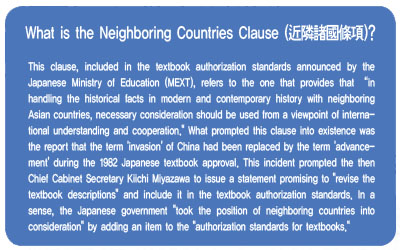동북아역사재단 2013년 07월호 뉴스레터
- Written by Lee Myung-chan, Research Fellow at NAHF Office of Policy Planning

Q : Why is the Neighboring Countries Clause receiving criticism?
In his answer at the lower house budget committee on April 10, 2013, Japanese Prime Minister Shinzo Abe (安倍晋三) said that "Unfortunately, the textbook authorization standards are failing to reflect the spirits of the revised Framework Act on Education that emphasizes respect for patriotism and love for homeland." And he mentioned the need for revising the textbook authorization system. What he implied in his answer was that the Neighboring Countries Clause which called for consideration for Korea and China in textbook descriptions should be also revised.
Abe said that it was questionable that the examiner who authorized the textbook describing that "comfort women" were "taken by the Japanese military" and "forced into" sexual slavery had "respect for Japan's tradition and culture" provided under the Framework Act on Education revised in 2006 (Note: Established in December 2006 during the first Abe administration, the revised Framework Act on Education provides that fostering respect for traditional culture and love for nation and homeland is the primary responsibility of education).
The notion behind such remarks is that the existing system makes it impossible to stop the self-deprecating descriptions of history found in many textbooks, notably social studies textbooks, and hinders the fostering of patriotism as provided under the revised Framework Act on Education. And the background of this notion is the Neighboring Countries Clause.
Q : How was the Neighboring Countries Clause enacted?
What prompted the enactment of the Neighboring Countries Clause was the 1982 textbook controversy. On June 26, 1982, a Nippon TV reporter said in his report on the authorization of textbooks for 1981 that "in a Japanese history textbook for high school, the term 'invasion' of northern China was replaced by the term 'advancement' during the approval process." This report prompted protest from China and South Korea, escalating into a diplomatic issue.
Although this report turned out to be a false one, then Chief Cabinet Secretary Kiichi Miyazawa (宮澤 喜一) issued a statement promising to revise the textbook descriptions and the approval standards, and take friendship with neighboring countries into consideration. What was added to the textbook authorization standards based on this statement is the Neighboring Countries Clause. This clause provides that "in describing what happened among the neighboring countries of Asia in modern and contemporary times, use necessary consideration from a viewpoint of international understanding and cooperation."
Q : Any movement to revise or abolish the clause?
On November 20, 2012, the LDP's Education Rebuilding Implementation Council (Chairman: Chief Cabinet Secretary Hakubn Shimomura (下村博文)) issued an interim report on five subcommittee meetings for the reform of textbook approval and adoption and the reform of the education committee system, among others, pointing out the need to review the Neighboring Countries Clause as a standard for textbook approval.
Based on this report, Abe decided that the review of the Neighboring Countries Clause would be the 'key policy of the new government' and included it in the LDP's lower house election pledges. Hakubun Shimomuro, appointed as the Minister of Education (MEXT) under the Abe administration, is an ultra-rightist politician who denies the existence of 'comfort women' forced into sexual slavery by the Japanese military. He is the one who drew up the LDP's 2012 general election pledges on education which included: 1) putting a stop to the education biased by self-deprecating views of history; 2) abolishing the Neighboring Countries Clause through an overhaul of the textbook approval system; and 3) reinforcing patriotism education.
Q : What is the basis of the case for abolishing the Neighboring Countries Clause?
Abolitionists who oppose the Neighboring Countries Clause argue that the enactment of this clause was unfair for two reasons as follows. First, the process of enactment was unfair. The report that the textbook examiner had 'invasion' replaced by 'advancement' was a false one (hence this incident is called the 'Invasion/Advancement False Report Incident'), and it was like selling off Japan's education sovereignty.
This draft and addition of this clause was not proposed at the request of South Korea and China; it had been merely suggested that the current Japanese history textbook descriptions should be revised with a 'friendly' touch. However, Chief Cabinet Secretary Miyazawa went beyond the scope of the request of the others and volunteered to shackle the future production of Japanese textbooks. The rationale behind this was to save his face as Chief Cabinet Secretary by ensuring that Prime Minister Zenko Suzuki(鈴木善幸)'s visit to China would go smoothly as scheduled in September. In other words, he sacrificed his nation's honor for his own personal interests.
Second, Japan's national sovereignty was unjustly infringed. There is no country other than Japan where the contents of their textbooks raised diplomatic issues. The reason Japan's textbook approval appears unreasonable to the international community is that Japan brought foreign intervention onto itself in a dispute over the contents of textbooks which was originally Japan's domestic issue. China does not take its neighbor Japan into consideration when making its own textbooks. Neither does South Korea. Why should it be only Japan that is required to show consideration for its neighbors? In China's textbooks, the description of the 'Nanjing Massacre' is overblown to highlight Japan's atrocity. Furthermore, hatred and resentment against Japan is being taught in various places of education. Decisions on what to choose from countless facts to teach and what to include in the textbooks obviously vary depending on country. 'Comfort women' or the order to Koreans to change their names in Japanese style may be important facts to the Korean, but to the Japanese, they were not important enough to be included in textbook and taught in classroom. This sums up the argument of the abolitionists of the Neighboring Countries Clause.

Q : What is the basis of the case for maintaining the Neighboring Countries Clause?
The argument of advocates for maintaining the Neighboring Countries Clause is as follows. First, the clause was written in 1982 based on 'repentance for the past.' In response to China's or South Korea's strong backlash against the glossed-over textbook descriptions of Japan's invasion of China or rule of Korea, the Japanese government issued a statement that "there is not a bit of change in our notion of repentance for the past" and "we will listen carefully to the criticism of the textbook descriptions and revise them accordingly upon the government's responsibility." And the Neighboring Countries Clause made based on this statement reflects Japan's such basic position. The phrase 'repentance for the past' in the government's statement was also included in both the Japan-Korea Joint Statement from 40 years ago and in the Japan-China Joint Statement from 33 years ago. As a recent example, the joint declaration by Japanese Primer Minster Keizo Obuchi and South Korean President Kim Dae-jung in which establishing a forward-looking Japan-Korea relations was emphasized was also based on 'repentance for the past.' It is without question important that young students should be taught both the bright and dark sides of history and to develop respect for other countries around the world.
Second, even though it resulted from a false report, the judgment was valid. The view that the clause resulted from the misunderstanding that a revision had been made in a textbook is the background of rethinking this clause. Even though the false report was surely wrong, the same cannot be said of the decision made at that time based on which the clause would be drafted. If there is some wrongly grounded backlash, it only needs to be dealt with an explanation based on correct theory and by keeping cool and mature as a nation. This will naturally inspire the children of Japan with pride. It is hard to say that Japan's textbooks are dictated by other countries simply because of this clause. According to the MEXT, there are no review comments confirmed to have been made based on this clause since 1991, and this year is no exception. This clause has served as a declaration of basic attitude rather than as an actual approval standard. Removing this clause, therefore, will be taken to mean sending the neighboring countries the message that "consideration for them will cease." This sums up the argument of advocates for maintaining the Neighboring Countries Clause.
Q : What should we do to deal with it?
While the dispute over the abolition of the Neighboring Countries Clause is a fundamental issue linked to Japan's own interpretation of history, it goes without saying that South Korea as a country directly concerned with this clause is against abolishing this clause. Abolishing this clause wouldn't be necessarily good for Japan's future either. Therefore, what we need to do is to network with those in Japan who support keeping the Neighboring Countries Clause and continue to provide them with indirect support. In addition, if it is deemed necessary to work with China, another country concerned, to press Japan, it would be better for us to take a mild and flexible approach.
At a more fundamental level, it would be more important to demand reflection on the Abe administration's overall perception of history than to be concerned too much with whether the 'clause' will be abolished or not. In other words, instead of dealing with each of the acts of conservative politicians who are keen on riding the conservative wave of recent politics in Japan by taking issue with the abolition of the Neighboring Countries Clause, we need to take a long-term perspective aimed at inspiring the Japanese people with correct historical consciousness. As an action plan to narrow the gap among the three East Asian nations in historical perception, I suggest that a joint history project should be carried out to make common history textbooks and use them as the basis of conducting common history education in the three East Asian nations.
Q : What is the Neighboring Countries Clause (近隣諸國條項)?
This clause, included in the textbook authorization standards announced by the Japanese Ministry of Education (MEXT), refers to the one that provides that "in handling the historical facts in modern and contemporary history with neighboring Asian countries, necessary consideration should be used from a viewpoint of international understanding and cooperation." What prompted this clause into existence was the report that the term 'invasion' of China had been replaced by the term 'advancement' during the 1982 Japanese textbook approval. This incident prompted the then Chief Cabinet Secretary Kiichi Miyazawa to issue a statement promising to "revise the textbook descriptions" and include it in the textbook authorization standards. In a sense, the Japanese government "took the position of neighboring countries into consideration" by adding an item to the "authorization standards for textbooks."


